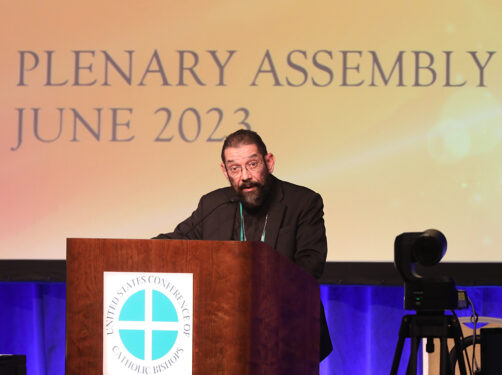
WASHINGTON — By a voice vote June 16 during their spring meeting in Orlando, Florida, the U.S. bishops decided to proceed with revisions on their Ethical and Religious Directives for Catholic Health Care Services, to specifically address if Catholic hospitals can provide gender-affirming medical treatment to transgender patients.
In a discussion on the floor just prior to the vote, several bishops emphasized the need for wide consultation in this work and to ultimately provide clear direction with care and sensitivity.
The bishops’ Ethical and Religious Directives for Catholic Health Care Services, often called ERDs, offer moral guidance for Catholic health care providers based on the Church’s theological and moral teachings. The document was first issued by the Catholic Health Association in the late 1940s and was first revised by the National Conference of Catholic Bishops in 1994. The sixth edition of the directives was issued in 2018.
The vote to update the directives was introduced to the bishops by Bishop Daniel Flores of Brownsville, Texas, head of the U.S. bishops’ Doctrine Committee, who stressed that revisions would be minor but would require in-depth consultation with bishops, theologians, ethicists, physicians, and other stakeholders in Catholic health care. The drafted revision, he said, would be subject to review and discussion and ultimately a vote by the body of bishops.
He said the guidelines’ purpose is to reaffirm ethical standards and behavior in health care based on Church teaching on the dignity and sacredness of all human life and “to provide authoritative guidance on certain moral issues that face contemporary health care.”
Bishop Flores noted that the section to be revised, on professional patient relationships, has not changed since 1994. At that time, he said, “it was not envisioned that it might be necessary to include specific guidance concerning radical modifications of the human body such as are widely advocated in practice today for the treatment of those suffering gender dysphoria.”
A revision of the guidelines, he said, would incorporate the guidance issued this March by the bishops’ Doctrine Committee in its document, “Doctrinal Note on the Moral Limits to Technological Manipulation of the Human Body,” that addressed hormone therapies and procedures related to gender.
He said the intent of the revision would be to “provide clear guidance” for Catholic health care facilities on this topic.
In their discussion, the bishops emphasized the need for broad and careful consultation in revision. Cardinal Joseph Tobin of Newark said consultation should include “people who are from the trans community” and that the revision should be presented in “language people will understand.”
“The ERDs are meant to be a pastoral, medical document to inform and guide the health care ministries in this case in their pastoral role to make sure it’s consistent with the Church,” said Cardinal Robert McElroy of San Diego.
He said one of the areas of focus in this revision would be to look at, “How do we help people who are wrestling with dysphoria?”
Other bishops also noted that changes to the directive would have to consider the impact on Catholic health systems and its impact on educational institutions as well.
It is a “delicate matter,” said Archbishop Paul Etienne of Seattle, who pointed out that 1 in 7 patients in the U.S. receives care in a Catholic health care facility.
Bishop Michael Olson of Fort Worth, Texas, said he hoped the revision would clarify the distinction between gender dysphoria and gender ideology, and said that after the document is revised, the bishops should issue a pastoral letter further addressing this issue.
When the vote to proceed with the work of revising the health care directives passed with no objections, Archbishop Timothy Broglio, president of the U.S. Conference of Catholic Bishops, said to Bishop Flores, “You’ve got your work cut out for you.”
